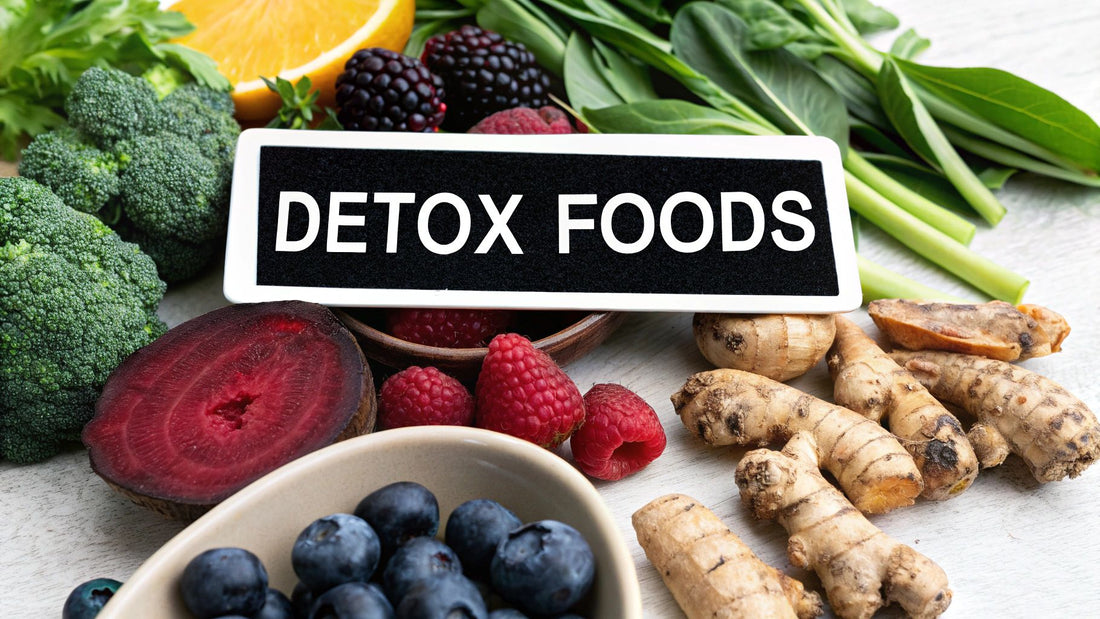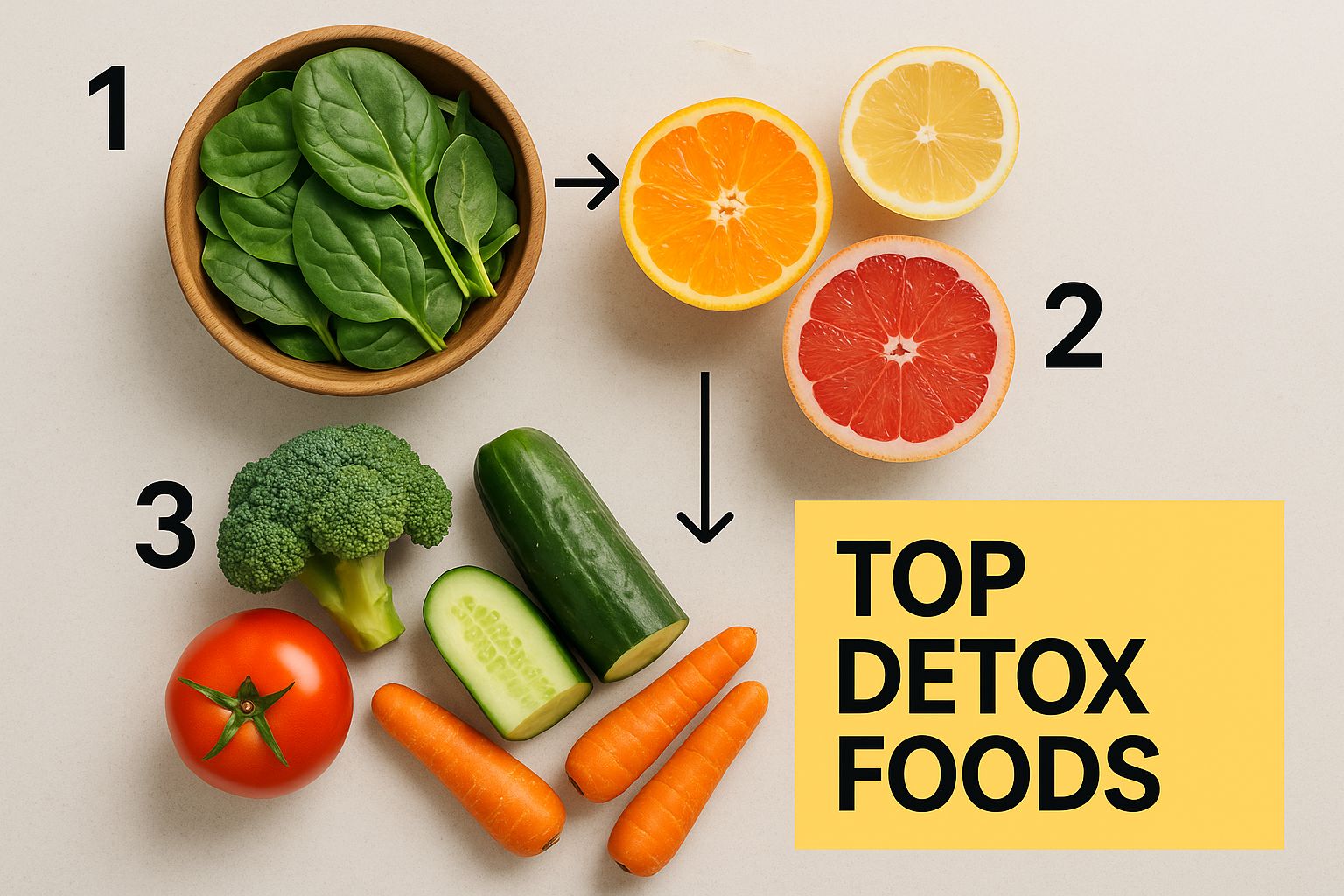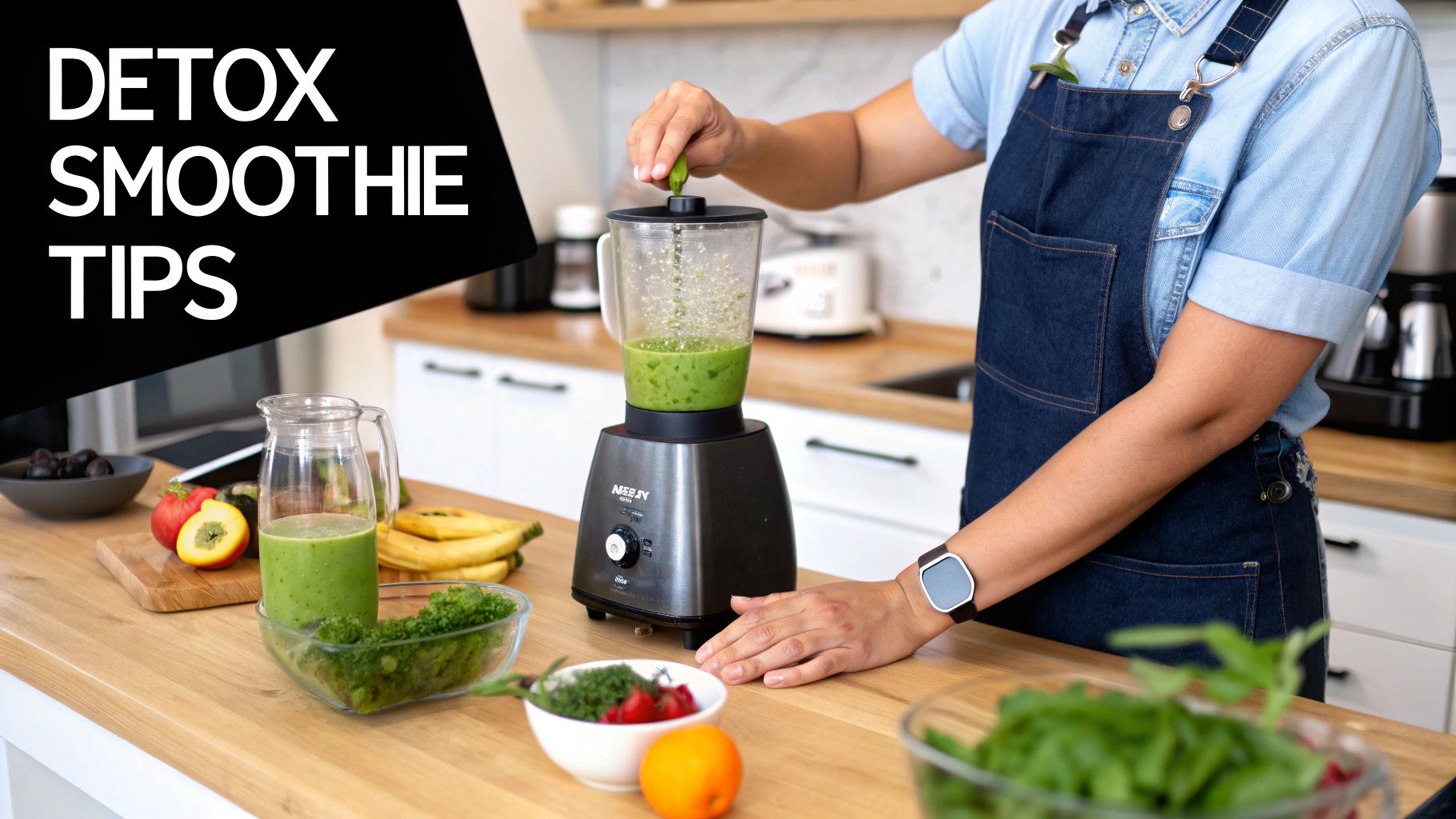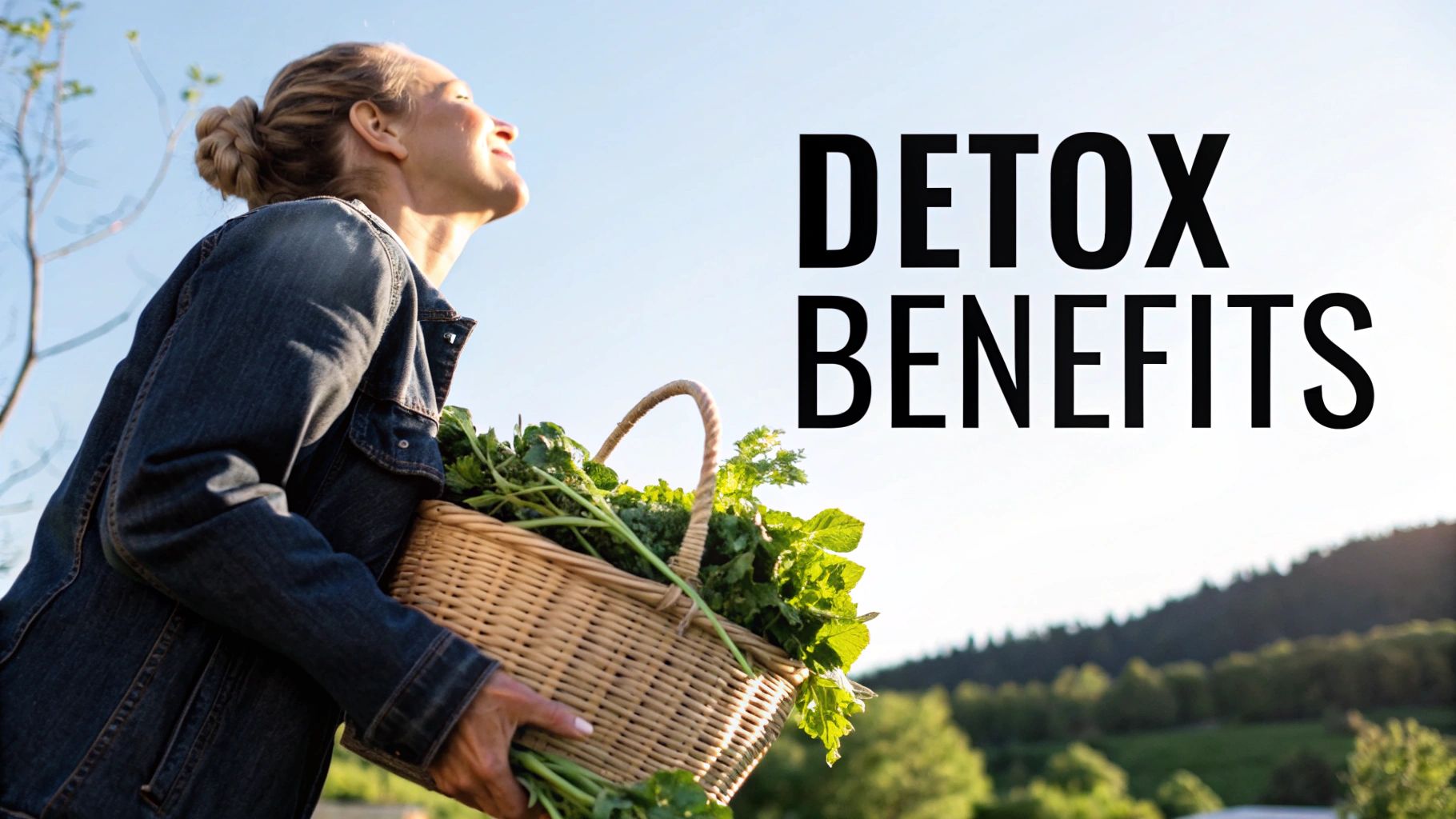
Natural Detox Foods Your Body Will Thank You For
Share
When you hear the term "detox foods," your mind might jump to a week of nothing but green juice. Let's toss that idea out. Real "detox foods" are simply whole, nutrient-packed foods that give your body the tools it already needs to do its job.
We're talking about fueling your body's own incredible, built-in detoxification systems. Instead of some quick-fix cleanse, this is about consistently eating things like leafy greens, berries, and cruciferous veggies. They're loaded with the antioxidants, fiber, and key vitamins your liver and kidneys crave, helping them run at their best.
What Are Natural Detox Foods, Really?
First, let's get one thing straight. Your body is a detoxification powerhouse. Your liver, kidneys, skin, and gut are working 24/7 to filter out waste and deal with toxins from the environment. They don't need a fad diet to kick them into gear.
The best way to think about it is like this: your body's detox system is a high-performance engine. It’s designed to run smoothly all on its own. Natural detox foods are the premium fuel for that engine. They don't magically scrub your system clean; they just provide the high-quality nutrients that help your body's natural processes run more efficiently.
Fueling Your Body's Internal Cleanup Crew
So, instead of forcing a "detox," the real goal is to nourish the organs that are already in charge. The foods we're talking about are full of specific compounds that help your body’s systems do their thing. The major players are:
- Antioxidants: Think of these as your cells' personal bodyguards. Found in foods like berries, beets, and spinach, they neutralize damaging free radicals before they can cause trouble.
- Fiber: This is your digestive tract's best friend. Found in whole grains, avocados, and kale, fiber binds to waste products and makes sure they're shown the exit efficiently.
- Specific Phytonutrients: These are special plant compounds that give your detox organs an extra boost. For example, sulforaphane in broccoli helps fire up liver enzymes, while betaine in beets supports their function.
The most effective strategy isn't a temporary, restrictive diet. It's about consistently weaving these whole, nutrient-rich foods into your daily meals to support your body's natural cleansing power.
At the end of the day, this is about shifting your mindset. Forget the short-term deprivation of a cleanse and embrace a long-term lifestyle of nourishment. By choosing these natural foods, you’re not just eating—you’re strategically equipping your internal cleanup crew with everything it needs to keep you feeling great.
How Your Body’s Built-In Detox System Works
Forget the idea of a punishing week-long "cleanse." The truth is, your body already has an amazing, self-cleaning system that works 24/7. It's a finely tuned network of organs designed for continuous detoxification, and understanding how it works is the key to giving it the right kind of support.
Think of it as an internal purification plant with three star players: the liver, the kidneys, and the gut. Each has a highly specialized role, but they all work together to filter, process, and get rid of waste. When we talk about natural detox foods, we're really just talking about giving this expert crew the best tools for the job.
The Liver: Your Master Filtration Plant
The liver is the undisputed MVP of detoxification. It juggles over 500 vital functions, acting like a sophisticated, two-stage cleaning facility that handles everything you eat, drink, and breathe.
- Phase I Detoxification: In the first step, liver enzymes get to work neutralizing harmful substances. They break down toxins into smaller, less damaging molecules. You can picture this as the initial rinse cycle, getting everything ready for the main wash.
- Phase II Detoxification: Next, the liver attaches specific molecules to these neutralized toxins, making them water-soluble. This process is like neatly packaging them up for shipping, making them easy for your body to finally kick out.
This two-phase system can't run on empty. It needs a constant supply of nutrients, especially B vitamins and antioxidants, to keep running smoothly. A diet that skimps on these essentials is like trying to run a factory with half the staff—the work just doesn't get done efficiently.
This visual highlights some of the best foods to support your body's natural cleansing mechanisms.

By focusing on vibrant, whole foods, you're directly fueling the very organs that keep your system running clean.
The Kidneys and Gut: Your Final Defense
After the liver has done its processing and packaging, the kidneys step in. These powerful organs are the final, fine-mesh filters, sifting waste products from your blood and sending them out of your body through urine. This is why staying hydrated is so important—water is what helps transport and flush all that waste away.
At the same time, your gut acts as a crucial gatekeeper. A healthy gut lining prevents toxins from leaking into your bloodstream in the first place, which lightens the liver's overall workload.
Detoxification isn't an event you schedule; it's a continuous biological process. Providing your body with a consistent intake of nutrient-rich, natural detox foods is the key to maintaining this system’s peak performance day in and day out.
This incredible internal machinery never stops. Your job isn't to force a "detox" but simply to nourish the system that's already working so hard for you.
The Key Nutrients That Power Detoxification

To really get how natural detox foods work their magic, we have to look closer at the specific nutrients doing all the heavy lifting. These vitamins, minerals, and unique plant compounds are the essential tools your body’s cleanup crew needs to do its job every single day.
Think of it this way: your liver's detoxification process is like a sophisticated assembly line. Each station on that line needs very specific tools to work properly. If those tools—our key nutrients—are missing, the whole system slows down. This creates a bottleneck, making it harder for your body to process and get rid of waste.
Let's break down the all-stars of the nutrient world.
Antioxidants: Your Cellular Bodyguards
Antioxidants are the first responders when it comes to protecting your cells. As your liver processes toxins, it naturally creates unstable molecules called free radicals. If you leave them to their own devices, they can cause a lot of damage.
That’s where antioxidants come in. They act like bodyguards, stepping in to neutralize these free radicals before they can cause trouble. This is a crucial job that keeps your liver and other organs healthy. You'll find these protective powerhouses in foods like berries, dark leafy greens, and beets.
Sulfur Compounds: The Detox Superchargers
Sulfur-containing compounds are absolute game-changers for the liver's "Phase II" detoxification pathway. This is the stage where the body packages up toxins for removal. These compounds help the liver make toxins water-soluble, which is just a fancy way of saying they get them ready to be flushed out by the kidneys.
Foods like broccoli, kale, and garlic are loaded with these superchargers. For example, a compound in broccoli called sulforaphane is famous for firing up key liver enzymes, essentially giving your internal cleaning system a major efficiency boost.
By focusing on foods rich in these specific nutrients, you are directly supplying your body's detox organs with the precise tools they need to perform their jobs effectively, turning a complex biological process into a simple matter of good nutrition.
B Vitamins and Key Minerals: The Essential Cofactors
Vitamins like folate and B12, along with minerals such as magnesium and selenium, play a different but equally vital role. They are known as cofactors, which means they are "helper molecules" that detoxification enzymes need to function. Without them, the entire process would grind to a halt.
Think of them as the spark plugs in your body's detox engine. They aren’t the fuel itself, but they provide the essential spark that gets the whole system running. You can find these helpers in a whole range of foods, from avocados to whole grains.
To help you connect the dots between the nutrients, their jobs, and the foods you can eat, we've put together this handy guide.
A Guide to Nutrients for Natural Detox Support
This table breaks down which nutrients help which organs and shows you exactly where to find them.
| Nutrient or Compound | Primary Role in Detox | Excellent Food Sources |
|---|---|---|
| Antioxidants (Vitamins C, E, A) | Neutralize free radicals and protect cells from oxidative damage. | Berries, citrus fruits, spinach, bell peppers, nuts, and seeds. |
| Sulfur Compounds | Support Phase II liver detox by helping make toxins water-soluble. | Broccoli, kale, garlic, onions, and collard greens. |
| B Vitamins (Folate, B6, B12) | Act as essential cofactors for enzymes in both Phase I and Phase II. | Leafy greens, avocados, legumes, and whole grains. |
| Fiber (Soluble & Insoluble) | Binds to toxins and waste in the gut, ensuring their final removal. | Oats, apples, beans, chia seeds from Naked Pantry, and avocados. |
| Glutathione | A master antioxidant that directly binds to toxins to neutralize them. | Asparagus, avocado, and spinach. |
As you can see, a varied diet full of whole foods is the best strategy for getting all the tools your body needs to keep itself clean and running smoothly.
Top 10 Natural Detox Foods to Add to Your Diet

Now that we've covered the science behind your body's amazing internal cleanup crew, let's talk about stocking the pantry. The best way to support your liver, kidneys, and gut is to consciously fill your plate with natural detox foods. This isn't about restriction; it's about making smart, delicious additions.
Think of this list as your guide to some of the hardest-working, most accessible foods out there. Each one brings something unique to the table, helping your natural detoxification pathways hum along exactly as they should.
Cruciferous Vegetables and Leafy Greens
If you're looking for detoxification all-stars, look no further than cruciferous veggies like broccoli, kale, and collard greens. They are loaded with a compound called sulforaphane, which essentially flips the switch on key liver enzymes, supercharging your body's ability to process and show toxins the door.
Leafy greens like spinach and kale pull double duty. They're bursting with antioxidants and chlorophyll, a plant pigment that can actually bind to certain toxins and help escort them out of your system. Plus, all that wonderful fiber keeps your digestive tract moving, which is the final, crucial step in waste removal.
Beets and Berries
Beets are truly in a league of their own when it comes to liver support. They contain special compounds called betalains and betaine that are known to protect liver cells and assist with the critical Phase II detoxification process. They also bring a special kind of fiber called pectin to the party, which helps mop up toxins the liver has already processed.
In a similar vein, berries—think vibrant blueberries, raspberries, and strawberries—are like little antioxidant bombs. Their gorgeous colors come from compounds called anthocyanins, which shield your cells from the oxidative stress that detoxification can sometimes create.
The most powerful approach to supporting your body isn't found in a bottle or a quick-fix cleanse. It's built meal by meal, by consistently choosing whole foods that are scientifically recognized for their ability to nourish and sustain your body's innate cleansing systems.
It's no surprise that products featuring these ingredients are gaining traction. The global detox drinks market, which is built on the power of fruits, vegetables, and herbs, was valued at around $5.7 billion in 2024. This number shows a real shift in public understanding—people are realizing that natural ingredients are the true key to supporting the body. You can discover more insights about the detox drinks market trend and its projected growth.
Alliums and Other Powerhouses
Don't forget about the humble onion and garlic. As part of the allium family, they are incredibly rich in sulfur. Why does that matter? Sulfur is a non-negotiable building block for producing glutathione, arguably the most powerful antioxidant your body manufactures. Glutathione gets right to work, binding to toxins to neutralize them.
To round out our top 10, here are four more fantastic foods to work into your routine:
- Avocado: A creamy source of healthy fats and that all-important glutathione. Avocados help protect the liver from being overworked while supporting its cleansing duties.
- Turmeric: The golden spice gets its power from curcumin, a potent anti-inflammatory and antioxidant that champions liver function and boosts bile production.
- Green Tea: Sipping on green tea gives you a healthy dose of catechins, a specific type of antioxidant proven to support and protect the liver.
- Citrus Fruits: Lemons, grapefruits, and oranges are famous for being high in vitamin C, an antioxidant that helps your body synthesize—you guessed it—more glutathione.
Making Natural Detox Foods a Part of Your Life
Let's be honest, the idea of a "detox" can sound intimidating. But what if we thought about it differently? Instead of a strict, short-term cleanse, think of it as weaving powerful, cleansing foods into your everyday life. It’s about making small, enjoyable choices that become second nature.
This isn't about a massive diet overhaul. It's about gradual, consistent upgrades that add up. The goal is to build habits that truly nourish you from the inside out, creating a foundation for long-term health and energy.
Starting Your Day Strong
Breakfast is your first chance to give your body what it needs, setting the stage for the rest of the day. A nutrient-dense smoothie is one of the simplest and most effective ways to get a powerful hit of vitamins, minerals, and antioxidants right from the start.
-
Build a Better Smoothie: Start with a base of leafy greens like spinach. Toss in a handful of antioxidant-rich berries, half an avocado for healthy fats and glutathione, and a scoop of chia seeds from Naked Pantry for a serious fiber boost. In just one glass, you're giving direct support to your liver and digestive system.
-
Elevate Your Oatmeal: Give your morning porridge an anti-inflammatory kick by stirring in some turmeric. A sprinkle of nuts and seeds on top adds crucial minerals that get your body’s natural processes humming.
Reimagining Lunch and Dinner
As you move through your day, keep an eye out for simple swaps and easy additions. A vibrant, colourful salad for lunch is a fantastic win. Don't just stick to lettuce—try adding shredded beets, kale, and broccoli sprouts to give your liver the powerful compounds it thrives on.
When it comes to dinner, think about adding both flavour and function. Roasting garlic and onions alongside your protein doesn't just taste amazing; it also releases their potent sulfur compounds. A simple side of steamed asparagus or sautéed collard greens offers a brilliant boost of fiber and key vitamins.
The most effective wellness routines are built one meal at a time. It’s about consistently choosing whole foods known to nourish your body's own cleansing systems, making great nutrition a natural, effortless part of your life.
This shift toward using food as medicine is more than just a trend. The global market for detox products, including functional foods and drinks, was valued at around USD 40.7 billion in 2025 and is expected to climb to USD 72.6 billion by 2035. This massive growth shows a real collective move toward natural, organic foods that support digestion and overall health.
Embracing these foods doesn't just support your body's main detox pathways; it can also help with specific issues. For example, a whole-foods approach can offer natural ways to relieve PMS bloating. It’s a perfect illustration of how a holistic diet supports your total well-being. By making these small, mindful choices every day, you're creating a powerful and lasting foundation for good health.
Got Questions About Natural Detox Foods? Let's Clear Things Up.
Diving into the world of detox foods can feel a bit overwhelming. There's so much noise out there—from marketing hype to wellness myths—that it's easy to get lost. So, let's cut through the confusion and get straight to the facts.
I'll walk you through some of the most common questions I hear, from whether you really need a punishing "cleanse" to the role of supplements, so you can make choices that actually work for your body.
Do I Really Need to Do a Strict "Cleanse" to Detox?
Absolutely not. This is probably the biggest myth in the wellness space. Your body is already an amazing, self-cleaning machine that works around the clock to detoxify itself. The best thing you can do is give it the right tools for the job, and that means consistently eating whole, nutrient-packed foods.
Those short-term, extreme diets often do more harm than good. They can strip your body of crucial nutrients like fiber and protein, which ironically makes it harder for your natural detox systems to function properly. A steady, supportive diet is always a better bet than a temporary, restrictive cleanse.
Are Detox Supplements a Good Substitute for Food?
Whole foods should always be your starting point—no exceptions. They offer a complex web of vitamins, minerals, fiber, and plant compounds that work together in a way that isolated supplements just can't mimic. Your body is built to get its nourishment from real food.
Now, that's not to say all supplements are bad. Some high-quality options can provide targeted support when needed, but think of them as helpers, not the main event. It's an area of growing interest, for sure—the global detox supplement market was estimated at USD 15 billion in 2025 and is expected to keep climbing. You can dig into the market trends for detox supplements to see what's behind this growth. But even with all this interest, the golden rule is simple: food first.
The real power isn't in a pill or a powder. It's in the cumulative effect of the nourishing foods you eat every single day. A diet rich in natural detox foods is a comprehensive toolkit that no single supplement can ever replace.
Is It Worth It to Eat Organic for a Better Detox?
Choosing organic can definitely give your body a leg up. When you eat organic, you’re cutting down on your exposure to synthetic pesticides and herbicides. This lightens the load on your liver and other detox organs, freeing them up to work more efficiently. Think of it as giving your internal cleanup crew less mess to deal with in the first place.
But don't let a tight budget discourage you from eating well. Simply washing your fruits and vegetables thoroughly is a very effective way to remove a significant amount of pesticide residue. At the end of the day, the most important thing is simply to eat more plants, whether they're conventional or organic.
How Soon Will I Actually Feel the Benefits?
This is the classic "it depends" answer, because everyone's body is different. Your current health, diet, and lifestyle all play a role. That said, many people start to notice a real difference—like more energy, smoother digestion, or clearer skin—within just a few weeks of consistently eating these kinds of foods.
The real secret is to stop thinking of this as a quick fix. It’s a lifestyle upgrade. The benefits don't just appear overnight; they build on each other as you continue to give your body the high-quality fuel it needs to function at its best.
Ready to stock your kitchen with high-quality, plastic-free staples that support your health and the planet? Naked Pantry makes it easy to fill your pantry with organic grains, seeds, and snacks without the harmful chemicals found in plastic packaging.
Start building your plastic-free pantry with Naked Pantry today.
